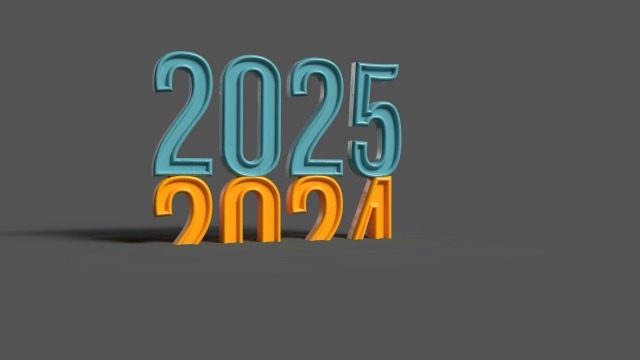Opinion: Nuclear madness and the vision thing

By Mark Kenny
A version of this article was originally published by The Canberra Times.
In a rare confluence of competing interests, both sides of politics have some cause for optimism heading into the new year.
Why? Because conditions in 2025 look like being better than 2024, possibly substantially better.
The election, whenever it is held, offers each a credible path to retaining their jobs.
Even practitioners of the "dismal science", otherwise known as economists, are seeing blue skies via multiple interest rate cuts perhaps beginning in February when the Reserve Bank holds its first meeting of the year.
The fact that this loosening of the monetary screws will have come too late to avoid unnecessary hardship won't make it any less welcome when it begins. Merely less corrective.
The central bank's board will not avoid criticism for being too slow to cut rates as growth has tanked, just as it was too slow to lift rates from functional zero back in 2021-22 as inflation made a run for it.
The country is in a per-capita recession with economic growth for the September quarter coming in at a near non-existent 0.3 per cent and just 0.8 per cent for the year.
Only public spending (state governments as well as federal) has kept an economic pulse detectable, and only tax cuts, second jobs, minimum wage growth and energy bill relief have kept some households afloat.
Inflation, let's not forget, already sits inside the RBA target range at 2.8 per cent.
The fly in the ointment is unemployment which came in last week at under 4 per cent, prompting market economists to re-warn that the RBA might hesitate to cut rates in February. Bless.
For all her accessibility and plain speaking, Michele Bullock's board appears ever-so-slightly traumatised by its past humiliations, which ironically, are enabling the same error again - that of waiting for incontrovertible evidence and thus forever playing catch-up.
Back to politics and the election, the risks are greatest for the Albanese government. Its dispatch after just one term would be a one-in-a-hundred-year political failure. Yet it goes into the election, mathematically at least, as the favourite to form government, albeit from a minority position. Thus, it is Labor's to lose.
A lack-lustre offering would see to that, as would any repeat of the tremulous campaign start from 2022.
Anthony Albanese's advisers know that the stakes are much higher now. Any uncertainty or errors of fact over policy or costings will play more harshly now that he is PM.
But error free is merely a prerequisite. Albanese must live up to the promise he has made to his caucus of a more ambitious reform agenda in a second term. They crave a unifying vision.
Recounting worthy measures already dialled in - cheaper medicines, cheaper childcare, fee-free TAFE, fairer tax cuts, etc. - will not work. Voters don't want to know what you've done but what you're going to do. They don't carry lists in their heads as they weigh their vote and they generally don't recall programs not directly affecting them.
So what could Labor do to spur the enthusiasm of voters across the board?
Universal early learning is one worthy objective and is already in train, but what about bringing basic dental into Medical Benefits Schedule as the Greens have long advocated?
It has never made sense that dental health (and the many deadly side-effects of poor dental health like heart disease, oral cancers, low self-esteem) was rendered inaccessible for the less affluent.
It would not come cheap. As recently as August, the independent Parliamentary Budget Office costed the incorporation of the full range of dental care at $45.6 billion over the 2024-25 budget forward estimates period.
In any event, the cost of living remains the key challenge - a political reality that mugged Kamala Harris. The thing about inflation is that it keeps hurting governments even after it abates. That's because "abates" is as good as it gets. Prices do not revert to pre-inflationary levels, they merely stop growing as fast.
American voters were still incandescent about soaring prices even as the Reserve viewed the problem as fixed and began cutting rates.
Another thing the Democrats under appreciated was the political potency of immigration. Labor has gone some way to neutralising that issue, but Peter Dutton will weaponise it relentlessly.
The opposition is not without its own vulnerabilities however, and they've just got worse.
Twenty years after Mark Latham's "own-goal" of "Medicare Gold", Dutton has unveiled his own version of an expensive "game-changing" promise that turns out to be poorly conceived and unaffordable.
In 2004, then-treasurer Peter Costello shredded the Labor opposition leader's guarantee for free hospital care for 75 year olds as unacceptable to the states and fiscally reckless.
In 2024, the political roles have reversed and Dutton's numbers are far worse - forget $3.3 billion and try $333 billion - all of it on the taxpayer and that figure based on absurd assumptions like declining demand for electricity.
Still, objectively bad policy and heartless fear-mongering did not stop Trump being preferred by American voters, so who knows?
For Dutton, buoyed by favourable polls, any decent advance on his current haul of 57 seats would enable him to hang onto his party's top job. And he might yet win this thing.
For Labor MPs and the crossbench, Dutton's bizarre nuclear careen is a welcome mood-lifter going into the summer break.
Mark Kenny is the Director of the ANU Australian Studies Institute and host of the Democracy Sausage podcast.








